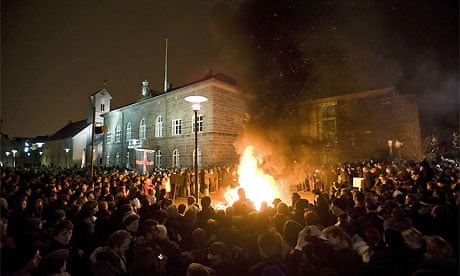While Barack Obama was being sworn in to office on Capitol Hill yesterday, the people of Iceland were starting the first revolution in the history of the republic. The word "revolution" might sound a bit of an overstatement, but given the calm temperament that usually prevails in Icelandic politics, the unfolding events represent, at the very least, a revolution in political activism.
Four months after the collapse of Iceland's entire financial system, no one has accepted any responsibility. Our currency has lost more than half its value, rampant inflation has already eaten up most people's savings, property values have dropped by more than a third and unemployment is reaching levels never seen before in the life of our young republic. The fault is clearly shared between the business elite and the government, which failed to regulate the newly privatised financial sector, allowing a few incompetent and egotistical business tycoons to gamble with the nation's fortune. And yet neither the government nor the bankers – who, by the way, seem to have disappeared into the cold thin air – see anything wrong with their own behaviour.
The governor of the central bank blames the risk-seeking bankers, the bankers blame the government and the prime minister attributes the whole crisis to the international credit crunch. This lack of any sense of responsibility has angered the Icelandic public to the extent that they have turned to the streets in greater numbers than ever before.
It started in October with peaceful demonstrations. Then the frustration grew, first with the lack of any sense of responsibility, then with the lack of any effective action to ease the economic pain most people feel – and finally with the sense that all the political elite were incompetent.
Initially the government tried to dismiss the protesters as frustrated wannabe politicians and disillusioned youngsters who did not understand the complexity of the situation. But when our grandmothers put down their knitting gear, strapped their boots on and took to the streets shouting for new elections we all saw that the disgust was almost universal.
Yesterday parliament resumed for the first time after Christmas. Without much organisation or central planning the public surrounded the parliament building and put forward a clear demand for early election. Ignoring them, the ministers and parliamentarians tried to sit out the protest, hiding inside the old building in downtown Reykjavik. This time it didn't work. The protests grew and ordinary people kept warm by burning torches in front of the building. They were going nowhere. Well into this dark night in Iceland's history, parliament remained under siege, and the vigil resumed this morning.
It is the first time in Icelandic history that a young anarchist can well expect to meet his grandmother in the crowd demonstrating against the government and drumming with her kitchen knife on pots and pans. The government is surely hanging by a thin thread and might fall at any moment.
The Icelandic public fear that their country has virtually been stolen by the globetrotting business elite that spent more time rubbing shoulders with international high society than giving back to the society that enabled them to enjoy this privileged lifestyle. Now ordinary Icelanders are determined to take their country back.
